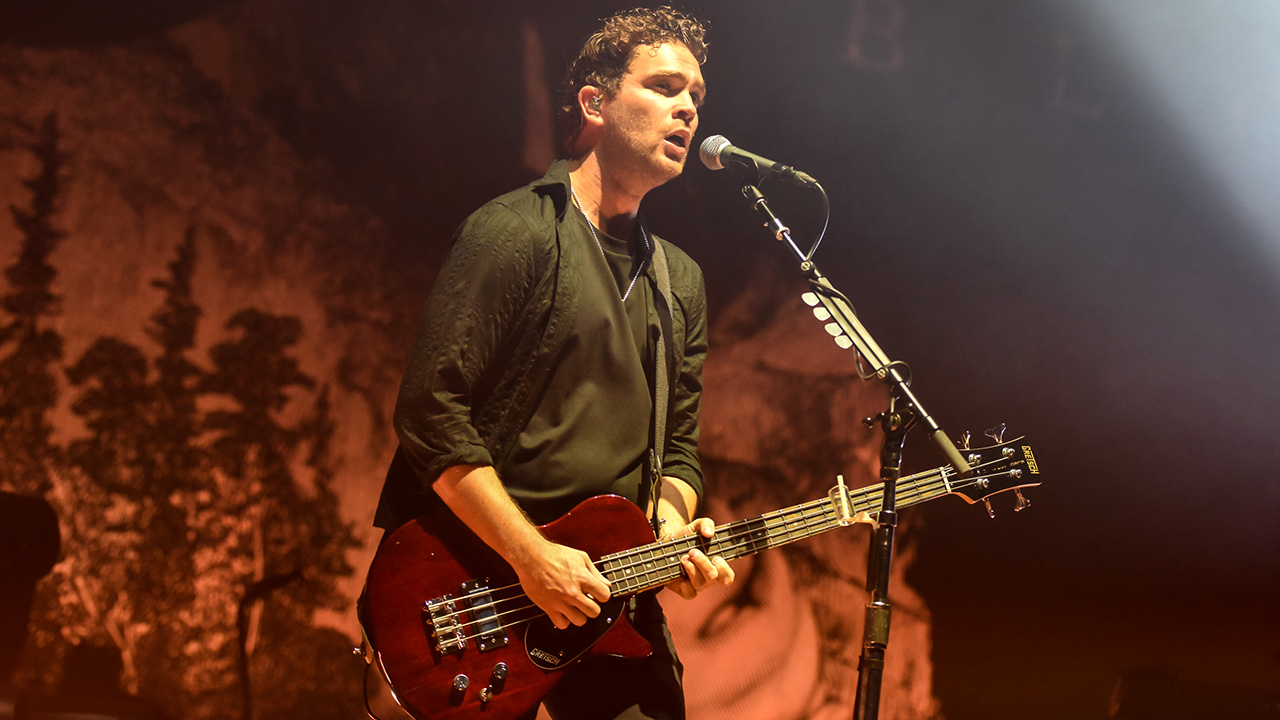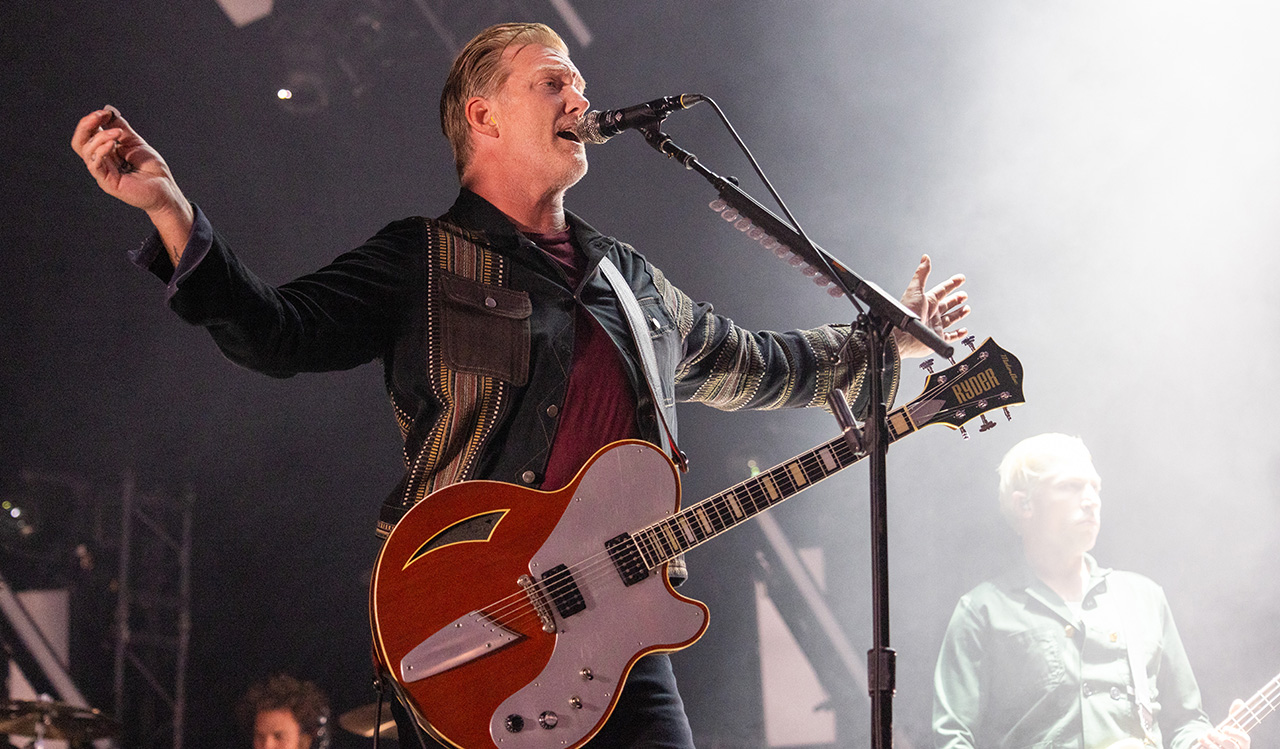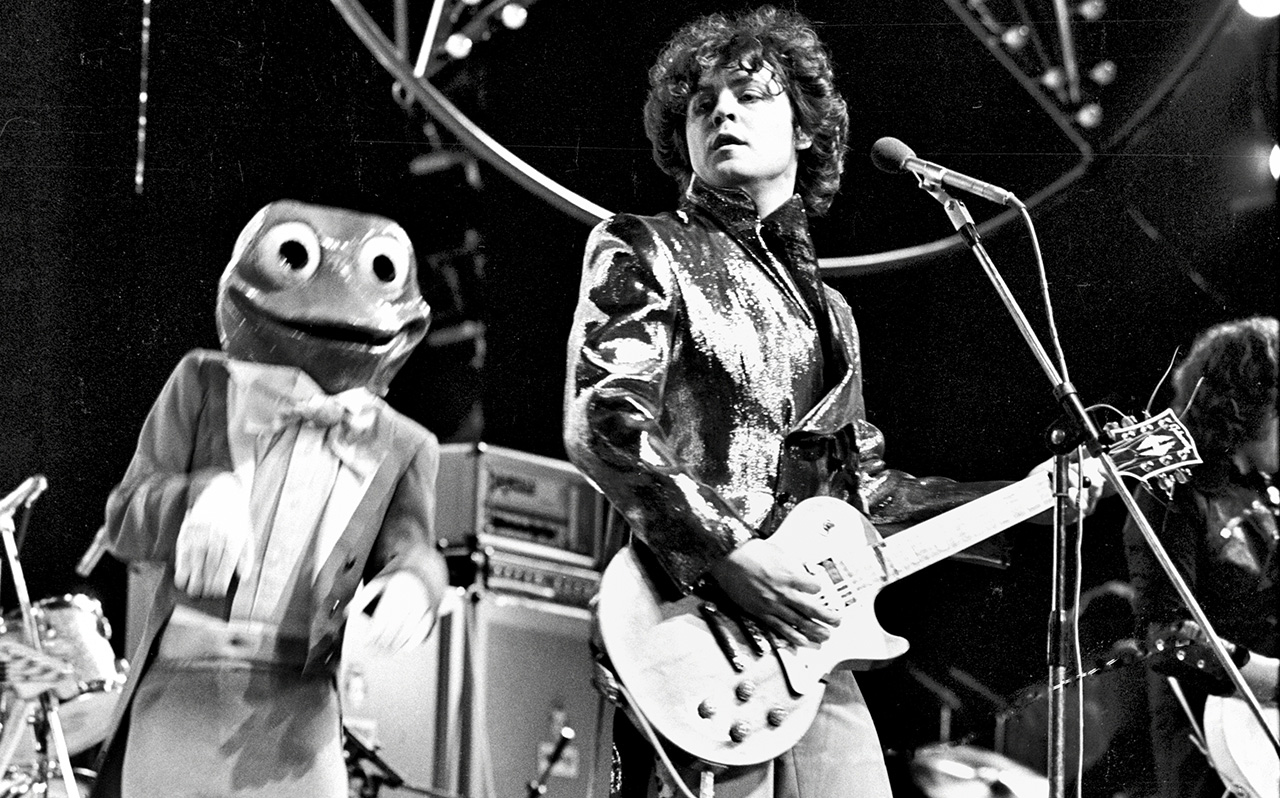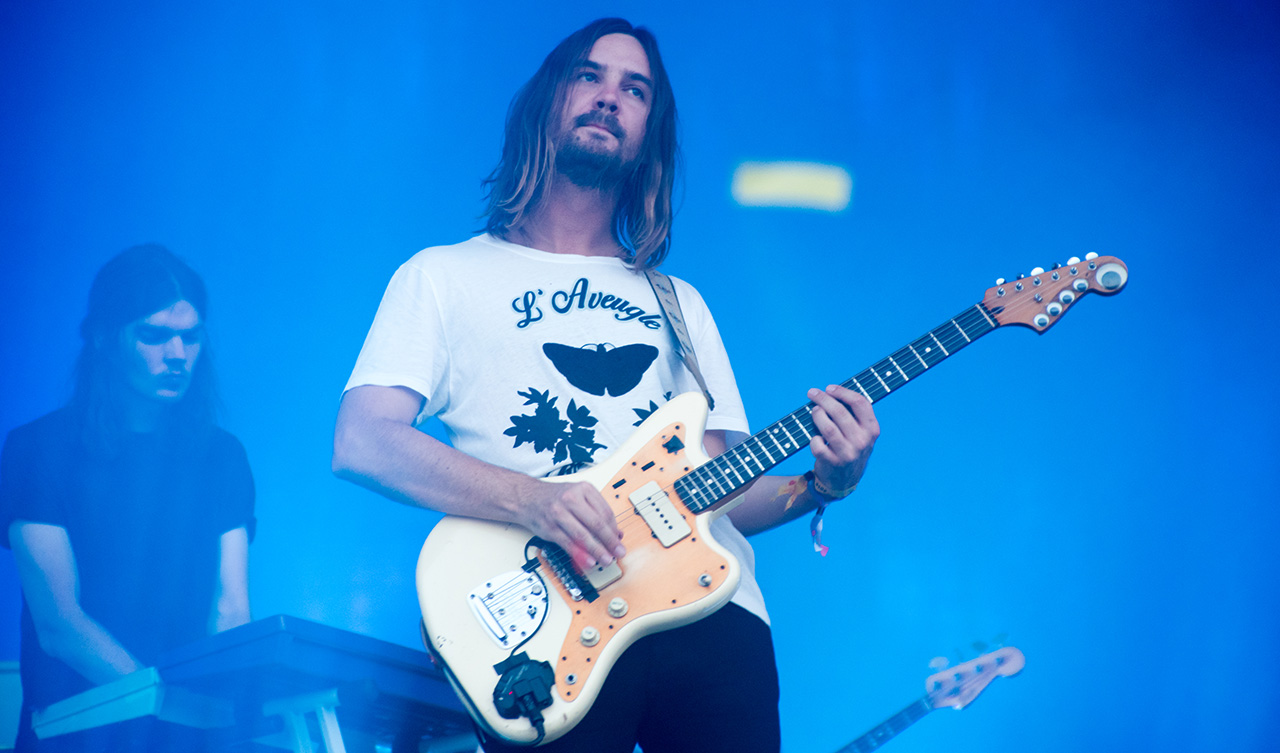“St. Vincent is one of the best players in the world right now… she has that Jeff Buckley thing going on”: Royal Blood’s Mike Kerr names 10 guitarists who shaped his bass sound
The Royal Blood frontman explains why guitarists have influenced him more than bassists as he marks the 10th anniversary of the duo’s debut album

All the latest guitar news, interviews, lessons, reviews, deals and more, direct to your inbox!
You are now subscribed
Your newsletter sign-up was successful
You may have noticed that Royal Blood singer/bassist Mike Kerr tends to take his cues more from guitar players. Whenever the frontman is quizzed on his biggest influences, he’s more likely to namecheck six-stringers than the likes of bass heroes Les Claypool, Thundercat and Flea.
That’s down to his highly unorthodox and brilliantly creative approach to the four-string. Being solely responsible for all the melodic information in the band, he manages to cover the low-end, midrange and higher frequencies all in one go, while drummer Ben Thatcher is left in charge of the rhythmic engine room driving the riffs.
And so while it may be somewhat uncommon to have a four-stringer to be listing their favorite players in GW’s Guitarists Who Shaped My Sound series, Kerr is actually a perfect candidate to provide a fresh take on things...
“If I was playing bass in a more traditional setup where there’s a guitarist with me, I would probably assume more of a traditional role sonically,” Kerr says. “In Royal Blood, everything I do has to be much riffier.
“Being in a two-piece demands more melody, I think. I’m playing bass and shifting what I play an octave up and it transcends into guitar territory. It’s a combination of different things, but that’s the main reason.”
This year, the band celebrate the 10th anniversary of the album that launched their career. The self-titled debut will be performed in its entirety at a few select shows – though many of the tracks remain setlist staples.
“Those tracks have grown with us,” Kerr says, “so this anniversary run doesn’t feel like dusting off relics we’re embarrassed by or anything like that! They’re still a part of the band we are now. I was only 22 or 23 when we made the first record, and it still defines the core of our sound.”
All the latest guitar news, interviews, lessons, reviews, deals and more, direct to your inbox!
Naturally, every band is looking to make an impact and build momentum in their career – but for Royal Blood, the first album was a case of writing music that appealed to them first and foremost. With their ambition and drive they placed their trust in following their ears, and the rest simply followed.
“We were just doing what we’d always been doing,” shrugs Kerr. “I don’t think we expected anything to change. It didn’t even feel like this band had a trajectory. I was at least 10 years into being in bands, writing songs and making music.
“There was an arrangement of Ben and I being the only members. We went through the ritual of spending £300 or £400 to make some basic demos, before going on to record our songs properly. It was as simple as that.”
The album was completed in stages, with producer Tom Dalgety [Ghost, Opeth, Pixies] helping the duo bring their ideas to life. By their own admission the band were a bit green at this stage, so his expertise proved invaluable.
Releasing the right songs recorded in the right way with the right producer cemented their first full-length in position as a landmark of the modern age – soon becoming the fastest-selling British rock debut of its time.
“The songs were recorded in batches,” Kerr says. “We went to a studio in Frome where we did Out Of The Black, Come On Over, Hole, You Can Be So Cruel and Figure It Out. That was pretty much everything we had at that point. We did it in two days before Glastonbury – the same year Matt Helders from Arctic Monkeys was wearing our band’s t-shirt.
“We’d been in the studio multiple times by then, in different interpretations of what this band has been; but we ended up developing a good friendship with Tom. He really nurtured me as a singer, writer and band member.
“At the beginning of Royal Blood, I would go up to his place, write songs and sleep in his basement, just hashing stuff out. So by the time we were tracking things properly with him, it felt like a realized thing. It was fun and easy making that album.”
As it turns out, Dalgety also had some influence on the gear that Kerr used to record the debut. He was mainly using a short-scale Gretsch Electromatic G2220 Junior Jet II, fed into a Fender Super-Sonic amp with an Electro-Harmonix POG2 handling the octave-up pitch-shifting, along with a Z.Vex Mastotron fuzz.
“The fuzz was just for Loose Change – which I feel is the standout track on the album,” Kerr continues. “Tonally, it kind of exists as its own thing on the record. The production is also quite different: a bit drier, tighter and more modern.
“The first session was when we did Figure It Out and I think Tom plugged me into a Marshall combo, though it’s hard to remember which model. There was also an Ampeg GVT guitar amp we used in places.
Jimmy Page has been very supportive of our band from early on, which feels kinda insane
“Another pedal was the Electro-Harmonix Germanium 4 Big Muff, which has an overdrive and distortion/fuzz section in one unit. You can drain the voltage out of the pedal to mess with the tone, so we ended up using that a lot.
“By the time we headed to Rockfield in Wales to record the next group of songs – stuff like Little Monster and Ten Tonne Skeleton – I think Fender were helping us out, so we had the Super-Sonic amps and the Starcaster bass.”
On the subject of the band’s sonic evolution, Kerr takes us through the 10 guitarists who shaped his sound…
1. Jimmy Page
“Jimmy Page is a massive influence on me – quite possibly the biggest out of everyone. Led Zeppelin were so monumental for me, and still are. Jimmy’s guitar tones are incredible, and the same goes for the groove and feel in his playing.
“He’s also been very supportive of our band from early on, which feels kinda insane. I have so much respect for him in general – not just for his guitar work, but as a writer, engineer, producer and overall visionary. His talents are pretty much endless!”
2. Josh Homme

“Hearing Queens Of The Stone Age was a very pivotal moment in my life. I was predominantly playing piano and keys in the previous bands I was in. Getting into QOTSA was probably one of the main reasons I picked up a stringed instrument.
“Listening to their music also gave me the confidence to sing. I always wanted to play heavy music, but I felt my voice wasn’t suitable for that because there’s something quite feminine about it. I usually sing quite soft. It’s almost like Josh Homme gave me permission.
“To have worked with Josh on some of our tracks and supported QOTSA on quite a few tours honestly doesn’t feel real. I’m lucky to have such extraordinary people in my life. It’s really special.”
3. Marc Bolan

“Marc Bolan and T. Rex had a similar effect on me. His voice is very soft and feminine. There’s a simplicity in his playing that I really love, especially with the ridiculously out-of-time and out-of-tune double tracking you get on T. Rex records. I’m obsessed – it’s so absurd that it makes everything sound as cool as fuck.
“I just love the looseness of all those records. If you solo each individual part they might sound kinda the same – but you put all those pieces together and it’s the most magical thing ever.”
4. Jeff Buckley
“What I love most about Jeff Buckley’s tracks on Grace is the chords he was using. They’re very muso and very exotic. He was so intelligent without being nauseating – he always kept it very tasteful. His songwriting was superb and his voice was something else; I honestly don’t know if there’s anyone better as a singer.
“A lot of my teenage years were spent learning his songs. His live guitarist, Michael Tighe, was also a big contributor to the sound. I think he played the opening chords on the track So Real, which sounds unbelievable. They’re probably jazz chords and I’m clueless when it comes to that stuff, but they sound perfect. Grace has inspired me a lot over the years.”
5. Jack White
“I kinda missed The White Stripes to begin with. I didn’t really discover them until later, but when I did I was transfixed by the aggression of his [Jack White’s] guitar playing. There’s an excitement he has that’s just fucking amazing.
“When he plays guitar it sounds like he’s so pumped to be playing. It’s so inspiring. I get a buzz off that energy, you know? He’s always bouncing off the walls when there’s a guitar in his hands.
“He’s also very interesting tonally. There’s a lot of interesting fuzz sounds, which has become a big part of my musical DNA. He loves vintage sounds, but isn’t fussy about vintage gear... and, honestly, I’m really clueless about gear.
“I think people are usually quite surprised by that, maybe because of my setup or sound. I just want things to work, but I’m not really interested in how they’re working.
“Another fuzz player I love is Dan Auerbach. Obviously The Black Keys always sound amazing, but I really enjoy what he does in The Arcs as well. Those records are unbelievable.”
6. John Frusciante

“Have I stuck to a ‘guitarists beginning with J’ theme? It looks like I have, except for Marc Bolan! John Frusciante has so much melody in his playing. I’m not sure if he’s influenced how I approach bass, but from a songwriting or melodic perspective, he’s definitely been influential.”
7. Andy Ghosh
“Turbowolf have been a massive influence on me, and I think you can hear it. What Andy does with his guitar, the tones he manages to get and the energy that comes out of him is always amazing. His riff writing is pretty epic.
“They’re a great band; I’ve toured and collaborated with them in the past.”
8. Kevin Parker

“Kevin is quite an underrated guitarist, even if everyone knows he’s an amazing songwriter and producer. I love the fact you can’t always tell what you’re hearing.
“He likes to blur the lines – is it a synth? Is it a guitar? Or is it both? He’s really good at that, without making it sound too weird or futuristic.”
9. Billy Gibbons
“The first time I heard ZZ Top was in Back To The Future Part III. After that I became a massive fan of Billy Gibbons’ playing. His sound is fucking unbelievable. There’s that half-cocked wah thing he does; and sometimes he can sound quite synthy, too.
“Sleeping Bag is one of my favorite ZZ Top songs. That one has been raging in the dressing room over the last few months. I’m probably more of a fan of their ’80s electronic-influenced albums, stuff like Afterburner. I think those records sound so unique; and they’re so daring.”
10. St. Vincent

“I would say St. Vincent is undoubtedly one of the best guitar players in the world right now. I think she has that Jeff Buckley thing going on, where she has a huge understanding of music theory but manages to include it in her riff writing and songs in very subtle and tasteful ways.
“She definitely has to be included as one of the biggest modern influences on my playing, just because of how brilliantly creative she is.”
- Royal Blood are currently touring Europe.
Amit has been writing for titles like Total Guitar, MusicRadar and Guitar World for over a decade and counts Richie Kotzen, Guthrie Govan and Jeff Beck among his primary influences as a guitar player. He's worked for magazines like Kerrang!, Metal Hammer, Classic Rock, Prog, Record Collector, Planet Rock, Rhythm and Bass Player, as well as newspapers like Metro and The Independent, interviewing everyone from Ozzy Osbourne and Lemmy to Slash and Jimmy Page, and once even traded solos with a member of Slayer on a track released internationally. As a session guitarist, he's played alongside members of Judas Priest and Uriah Heep in London ensemble Metalworks, as well as handled lead guitars for legends like Glen Matlock (Sex Pistols, The Faces) and Stu Hamm (Steve Vai, Joe Satriani, G3).






